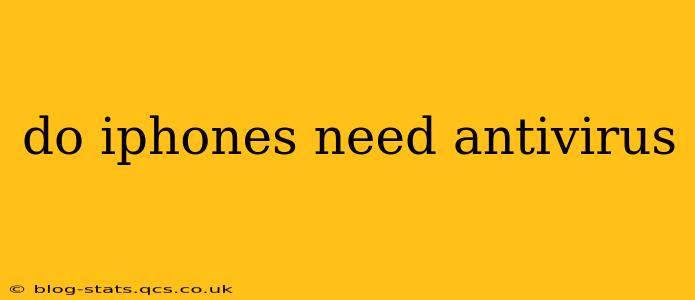The question of whether iPhones need antivirus software is a common one, sparking debate among tech enthusiasts and everyday users alike. The short answer is more nuanced than a simple "yes" or "no." While iPhones are generally considered more secure than Android devices, they are not entirely immune to threats. Therefore, the need for antivirus software depends on several factors, including your individual usage habits and risk tolerance.
What Makes iPhones Relatively Secure?
Apple's iOS operating system boasts several inherent security features that minimize the risk of malware infections compared to Android's open-source nature. These include:
- App Store Vetting: Apple rigorously vets apps submitted to its App Store, reducing the likelihood of malicious software slipping through. This process, while not foolproof, significantly lowers the risk compared to sideloading apps from unknown sources on Android.
- Sandboxing: Each app on an iPhone operates within a restricted "sandbox," limiting its access to other apps and system files. This prevents a compromised app from wreaking havoc on the entire device.
- Regular Software Updates: Apple regularly releases iOS updates that patch security vulnerabilities. Staying current with these updates is crucial for maintaining a high level of security.
- Strong Encryption: iOS employs robust encryption to protect user data, making it considerably more difficult for unauthorized individuals to access sensitive information.
So, Do I Really Need Antivirus on My iPhone?
While the inherent security features of iOS offer robust protection, several scenarios might warrant considering antivirus software:
- Jailbreaking: Jailbreaking your iPhone removes Apple's security restrictions, opening it up to vulnerabilities and significantly increasing the risk of malware infections. If you've jailbroken your device, antivirus software is strongly recommended.
- Sideloading Apps: Downloading apps from sources other than the official App Store bypasses Apple's security checks, introducing a considerable risk of malware. Again, antivirus software becomes essential in this scenario.
- Public Wi-Fi Usage: Connecting to unsecured public Wi-Fi networks exposes your device to potential attacks, including man-in-the-middle attacks that can intercept your data. While not directly malware, an antivirus app with a VPN feature can offer additional protection.
- High-Risk Online Activities: If you regularly engage in high-risk online activities, such as visiting suspicious websites or downloading files from untrusted sources, antivirus software can provide an extra layer of security.
- Peace of Mind: Some users simply prefer the added security and peace of mind that antivirus software provides, even if the risk of infection is relatively low.
What About Anti-Theft Features?
Many antivirus apps for iOS offer anti-theft features, such as remote device tracking and data wiping. These features can be valuable if your device is ever lost or stolen. However, it's important to note that iOS's built-in "Find My" feature already provides robust anti-theft capabilities.
Are There Free Antivirus Apps for iPhones?
Yes, there are several free antivirus apps available for iPhones on the App Store. However, it's important to carefully review user reviews and research the app's reputation before installing it. Free apps often come with limitations, such as fewer features or intrusive advertisements.
Should I Use a Paid Antivirus App?
Paid antivirus apps often offer more comprehensive features and support, but whether the cost is justified depends on your individual needs and risk tolerance. If you are a cautious user, it can be a wise investment. It's important to find an application reputable and proven effective.
The Bottom Line:
While iPhones are inherently more secure than Android devices, they're not invulnerable. The need for antivirus software depends on your individual usage habits and risk tolerance. If you've jailbroken your device, sideload apps, frequently use public Wi-Fi, or engage in high-risk online activities, antivirus software can provide an additional layer of protection. For most users who stick to the App Store and practice good online hygiene, the built-in security features of iOS are usually sufficient.
